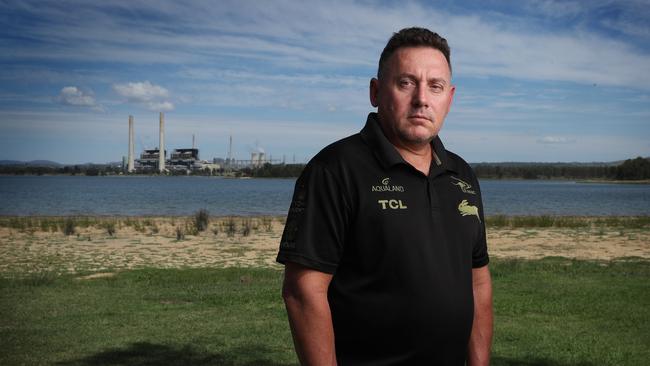NSW Hunter Valley coal jobs on the line, and with them votes
Residents of the Upper Hunter are fed up. With the closure of AGL’s Liddell coal-fired power plant and the imminent shutdown of mines, they are on edge.

If you’re thinking of leaving the Upper Hunter town of Singleton at 4pm on a weekday, think again.
Thousands of cars, trucks and trailers line the New England Highway as the coal workers head home after their shifts.
“You see it everyday, mate,” explosives technician Michael Miller says, standing on the main road, schooner in hand, still wearing a hi-vis vest. “I’ll tell ya what it shows us. It shows us how important coal is to this town.”
Residents of the Upper Hunter are fed up, Mr Miller says. With the closure of AGL’s Liddell coal-fired power plant and the imminent shutdown of mines, they are on edge.
Hunter local Jamie Gattin says: “Muswellbrook and Singleton will become ghost towns when the power plant and the coalmines close. The local businesses will have to shut their doors or move out of town.”
Mr Gattin, 54, who has worked at BHP’s Mt Arthur mine for more than 11 years, says young people will feel the greatest pressure. “It’s the trainees who are screwed,” he says. “The future of coal is not as secure as it used to be and jobs won’t be readily available. They won’t be able to complete the 40-year careers they would hope to.”
As the state election looms, candidates are aware of the stakes. Nationals MP David Layzell won the seat in a by-election in May 2021 following the forced resignation of Michael Johnsen over his use of sex workers. Mr Layzell, despite the scandal, managed to increase the Nationals’ margin from the 2019 election.
Labor has never won the Upper Hunter, but with the Coalition’s margin now an estimated 3.7 per cent based on the by-election result and a redistribution, it is in with a better chance than ever.
“When it comes to local issues, the Liddell closure is a big one,” Mr Layzell says. “You’ve got people who have worked there for generations. It’s one of those places where a lot of people got their jobs when they were young, worked there for decades and then got jobs for their kids there.”
He knows it is not just a local issue. All eyes are on the electorate, with already high energy prices set to shoot through the roof when Liddell closes. Plus, with the transition of the Liddell plant to a hydrogen hub under plans by AGL and Fortescue Future Industries chairman Andrew Forrest, the state has hinged its hopes of a greener future on the area.
Despite the “emotional attachment” to the station, Mr Layzell says it is about time the “Old Girl” was pulled down, and backs AGL’s transition plan for workers.
Just over half of Liddell employees will transfer to the neighbouring Bayswater power station when the plant closes at the end of April. There, many will retrain and be deployed back to Liddell once it has transitioned to the hydrogen hub. A third of employees have taken voluntary retirement or sought jobs elsewhere. The remaining workers will take voluntary redundancy.
AGL has strict policies forbidding Liddell workers from speaking with the media, but one discreetly tells The Australian: “They’re really trying to keep people motivated in the twilight days before closure. The vibe is good and it’s still a great place to work, however, you can definitely sense an element of sadness.”
Small businesses are preparing for the worst. Singleton pub licensee Brad Hill says he will take a hit when Liddell shuts.
“The shutdown will affect their business, it will affect our business, it will affect the guys working there that have to find new jobs, it will affect their families,” he says. “It just has a massive knock-on effect.”
Up to 2000 jobs will be at risk if BHP closes the Mt Arthur mine as scheduled in 2030. Meanwhile mining giant Glencore is working to phase out its coal operations in the area. It plans to shut 12 mines by 2035, including Newland and Liddell by the end of the year.
Mr Layzell touts the Royalties for Rejuvenation fund as a solution to the job losses, promising $25m to support economic diversification by funding infrastructure, services and programs.
But Labor opponent Peree Watson has a different take. A first-time candidate and the daughter of a former president of the mineworkers’ union, she says the “doom and gloom” around mining is a “media beat-up”.
“Coalmines are not closing. There is a strong future for coalmining in the Upper Hunter,” she says. “So we have to cut the doom and gloom.”
She blames the Coalition government for selling the Liddell plant to AGL, saying “if that infrastructure had been in state government hands we would have had absolute certainty of where the new jobs were going to come from.”
So what does this mean for the March 25 poll? “Well,” Mr Miller says, “If someone can actually tell me what jobs and coal in the Hunter will look like in 10 years’ time they’ll get my vote.”



